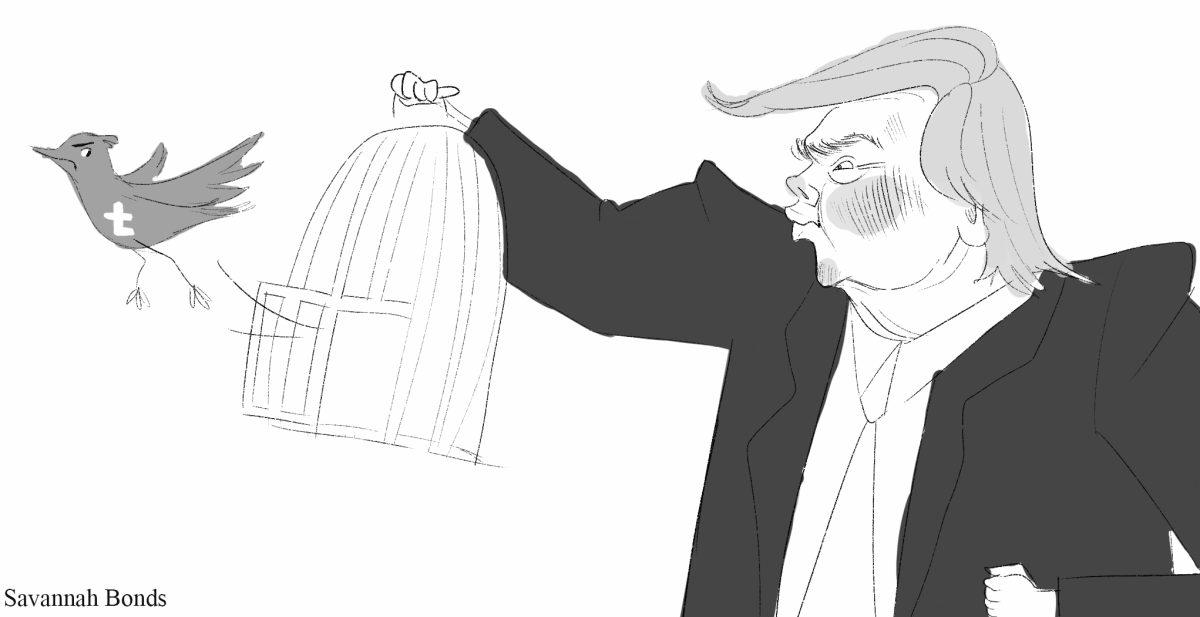As of Jan. 8, President Donald Trump is suspended from having a personal account on all major social media platforms.
“We are living Orwell’s 1984,” Donald Trump Jr. tweeted on Jan. 8. “Free-speech no longer exists in America.”
There has been much debate on the amount of power these companies should be allowed to have, especially in concerns to the government.
According to Monica Anderson with Pew Research Center, 72% of adults in the U.S. believe social media companies retain too much political power and influence. Most people agree on this aspect, but it becomes quickly divided with the issue of censorship.
The American Civil Liberties Union defines censorship as “the suppression of words, images, or ideas that are ‘offensive,'” and when carried out by the government, it is unconstitutional.
Before the past two presidential elections, the internet was a fairly open platform. There were some regulations, but for the most part, corporations were not taking any action to control the content posted to their platforms. This has changed drastically as of recently.
Within the last year, tech leaders have appeared before government committees to discuss the modification of their algorithms and advertising practices to create a more welcoming and civil environment for their users.
Facebook CEO Mark Zuckerberg appeared before the Senate Judiciary Committee on Nov. 17, 2020 to discuss content moderation issues and how Facebook would be moving forward with them. These policies angered many people and evoked a vast number of responses claiming they violate the First Amendment.
The First Amendment states, “Congress shall make no law respecting an establishment of religion, or prohibiting the free exercise thereof; or abridging the freedom of speech, or of the press.” The amendment only applies to government restrictions, not private entities such as churches, employers or social media companies.
There are specific rule violations in media law which a private party can pursue, but the First Amendment is not being violated in this circumstance. This is not to say people are not being censored, because they are. However, no action can be taken toward these companies under claims they violate free speech.
As far as banning the president, it works no differently. President Trump agreed to the same terms and conditions everyone else did when signing up for Twitter. He was suspended for violating these terms, specifically the Glorification of Violence policy.
His tweets were classified as statements which, according to Twitter, “were highly likely to encourage and inspire people to replicate the criminal acts that took place at the U.S. Capitol on January 6, 2021,” in response to the 2020 presidential election.
However, the president should be able to perform his job successfully without this platform and run the country as every other president has done before the digital age.
The president’s Twitter account was introduced during Barack Obama’s presidency in 2009, so it is a very new tool for addressing the public which can ultimately be done without.
President Trump will have to rely on the old ways of speeches, emails and press conferences to get his messages out, not just a little blue bird.
As far as if this should be allowed, that is a moral question to be handled by the government. Will they pass a new legislature to crack down on Silicon Valley’s power, or is that an act of infringement?
Pew Research Center says about 53% of Republicans and 52% of Democrats support increased regulation of big tech industries. Both sides agree on some form of management, but deciding which aspects get supervised and who does the supervising is a whole other issue in itself.
Only time will tell where we are headed, but these are questions which must be answered to maintain our status as a free nation which honors freedom of speech, assembly and above all, the press.
Freedom of speech is not gone, contrary to President Trump’s claims of oppression. He can still address the country through government means as his right is protected as an American citizen. Trump can continue to spout his allegations free of any mediation outside of a private company’s platform because of the First Amendment. To say it no longer exists is misleading and untrue which is one of the reasons why he got banned in the first place.








